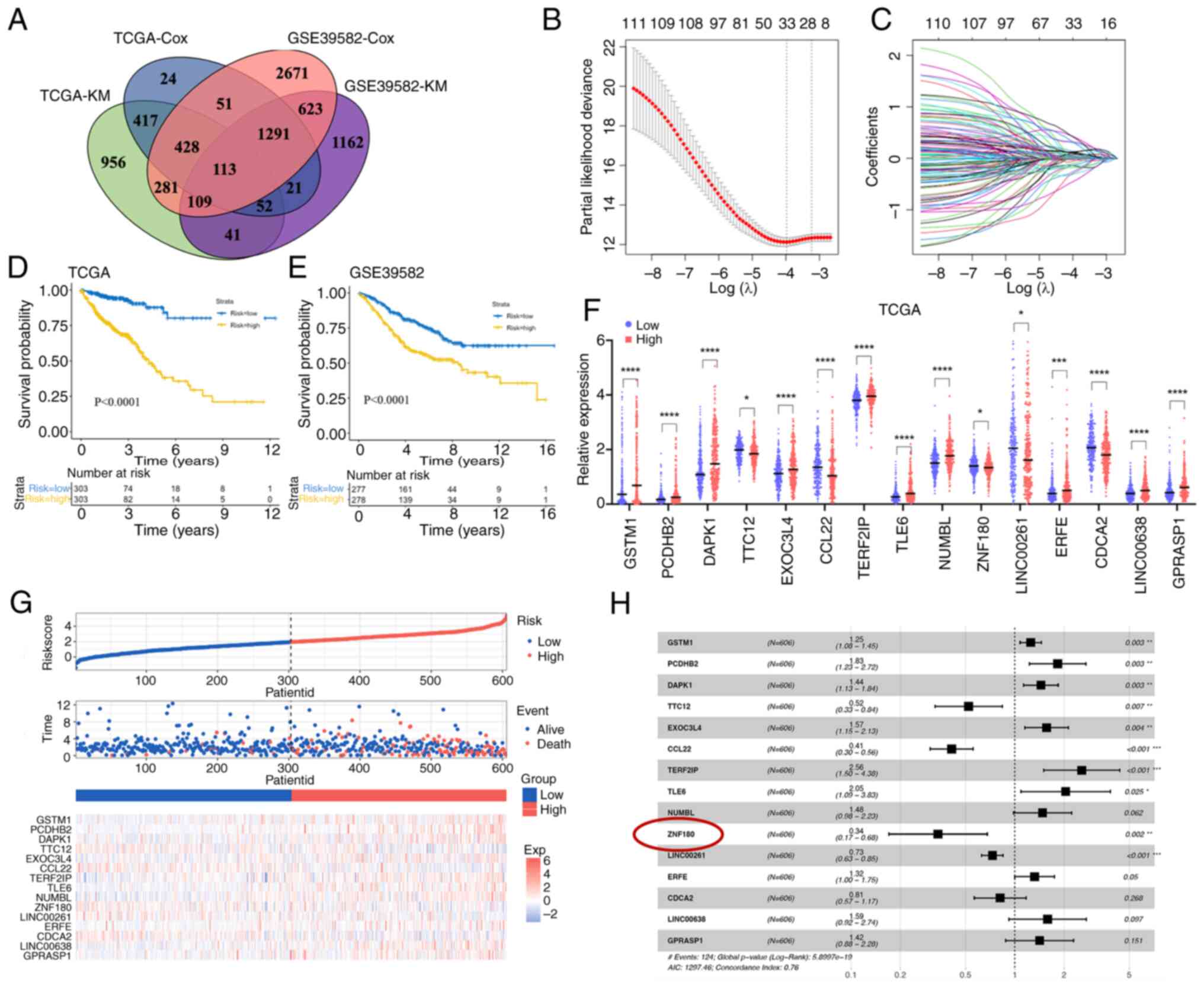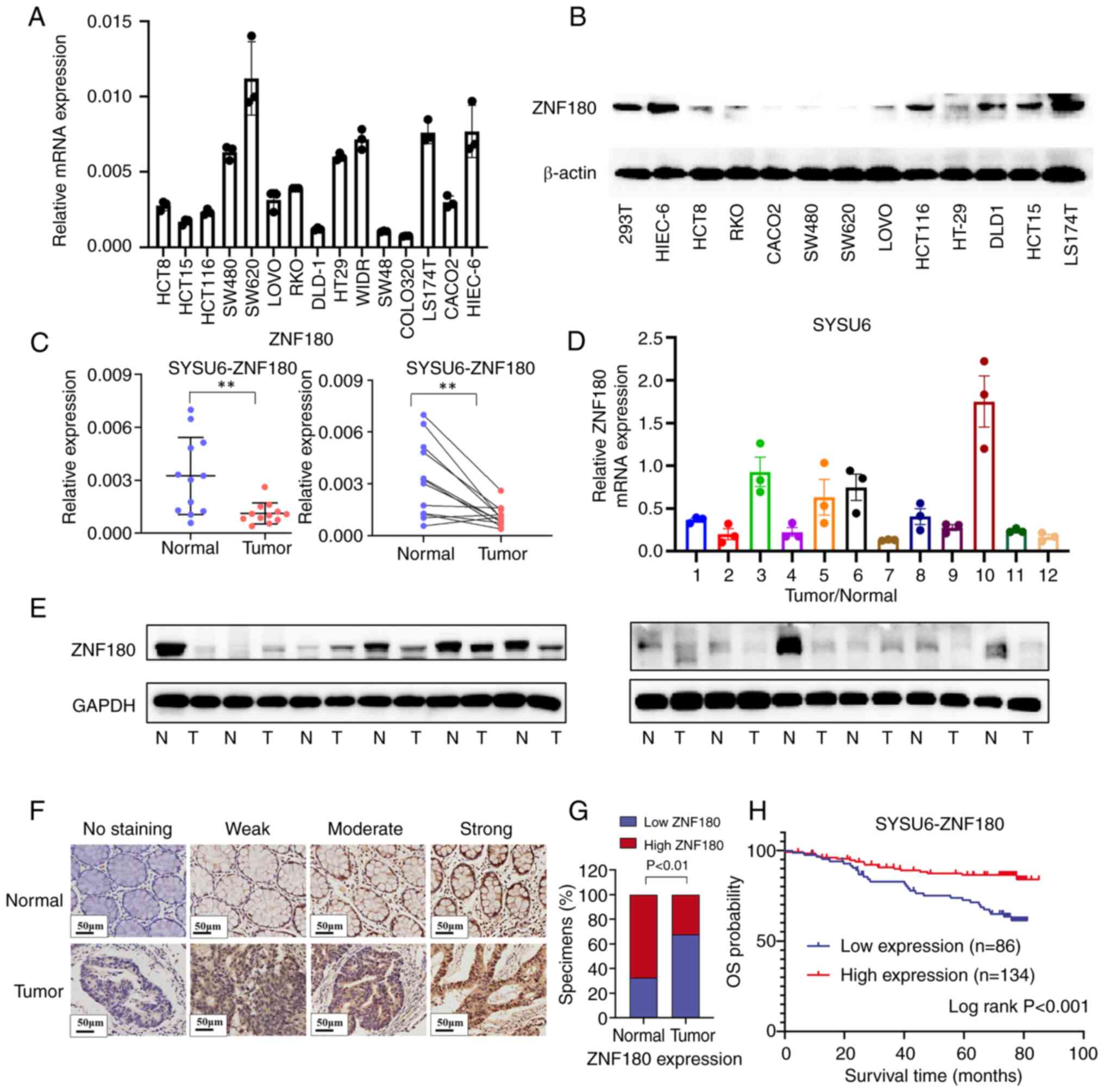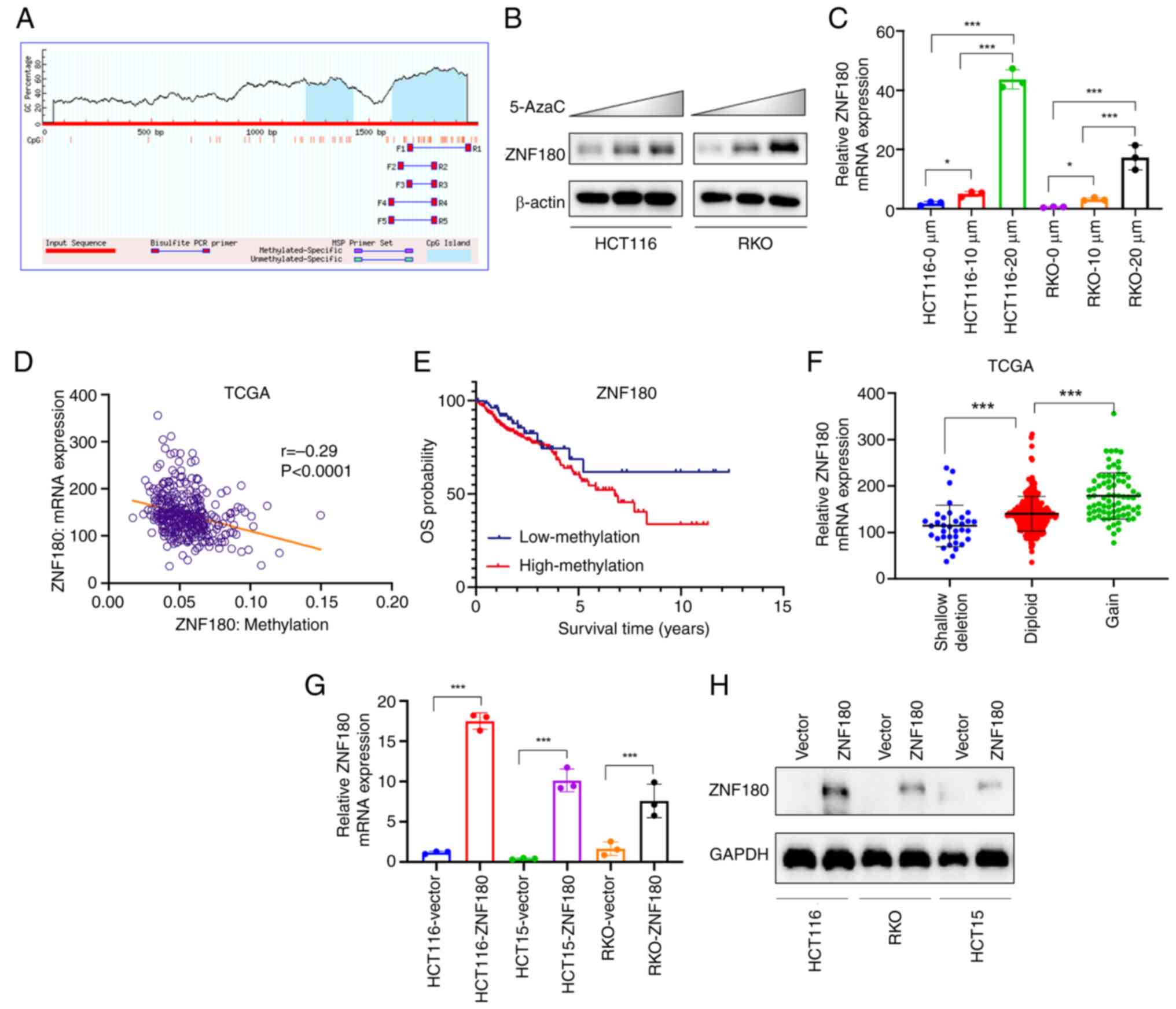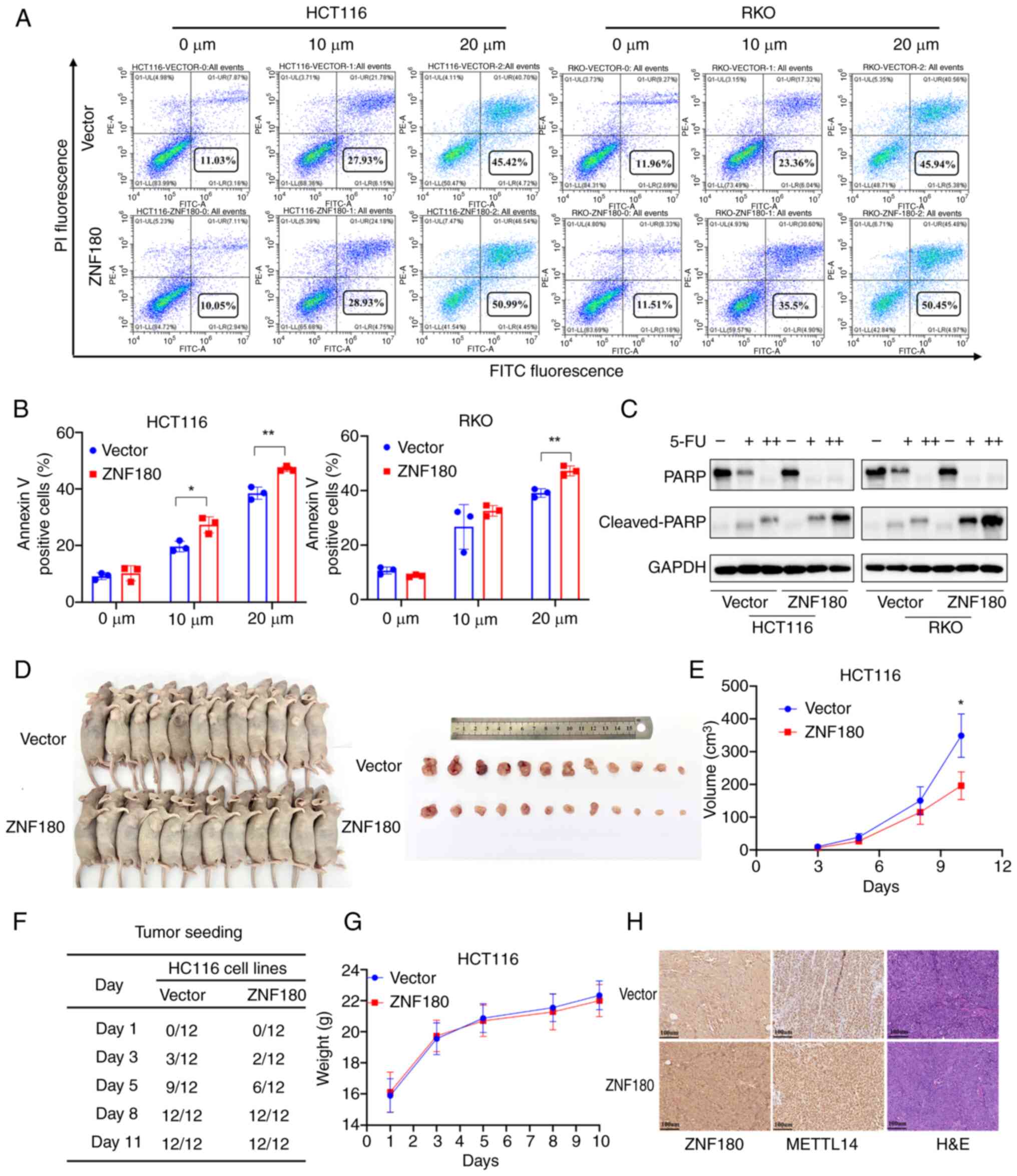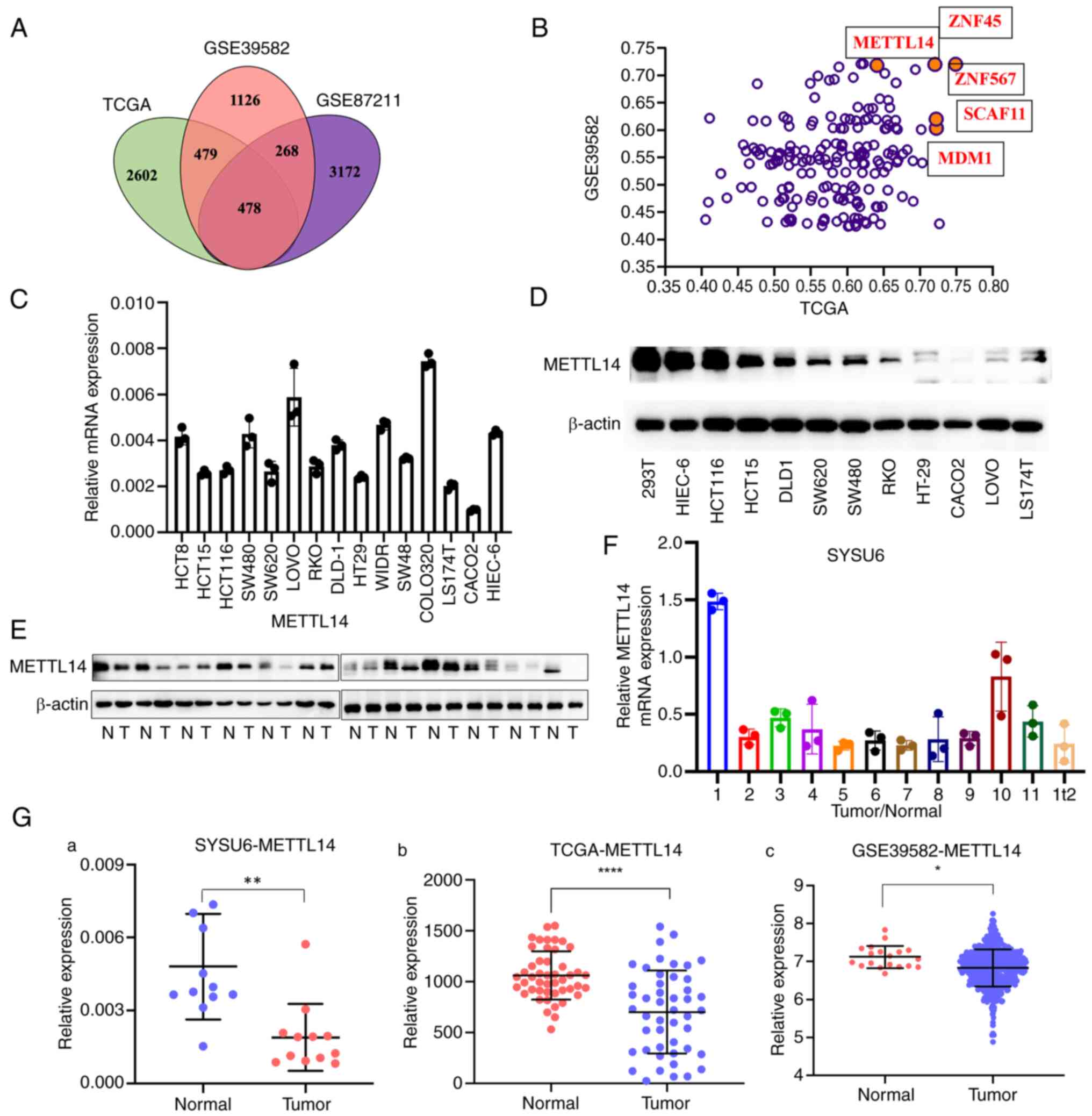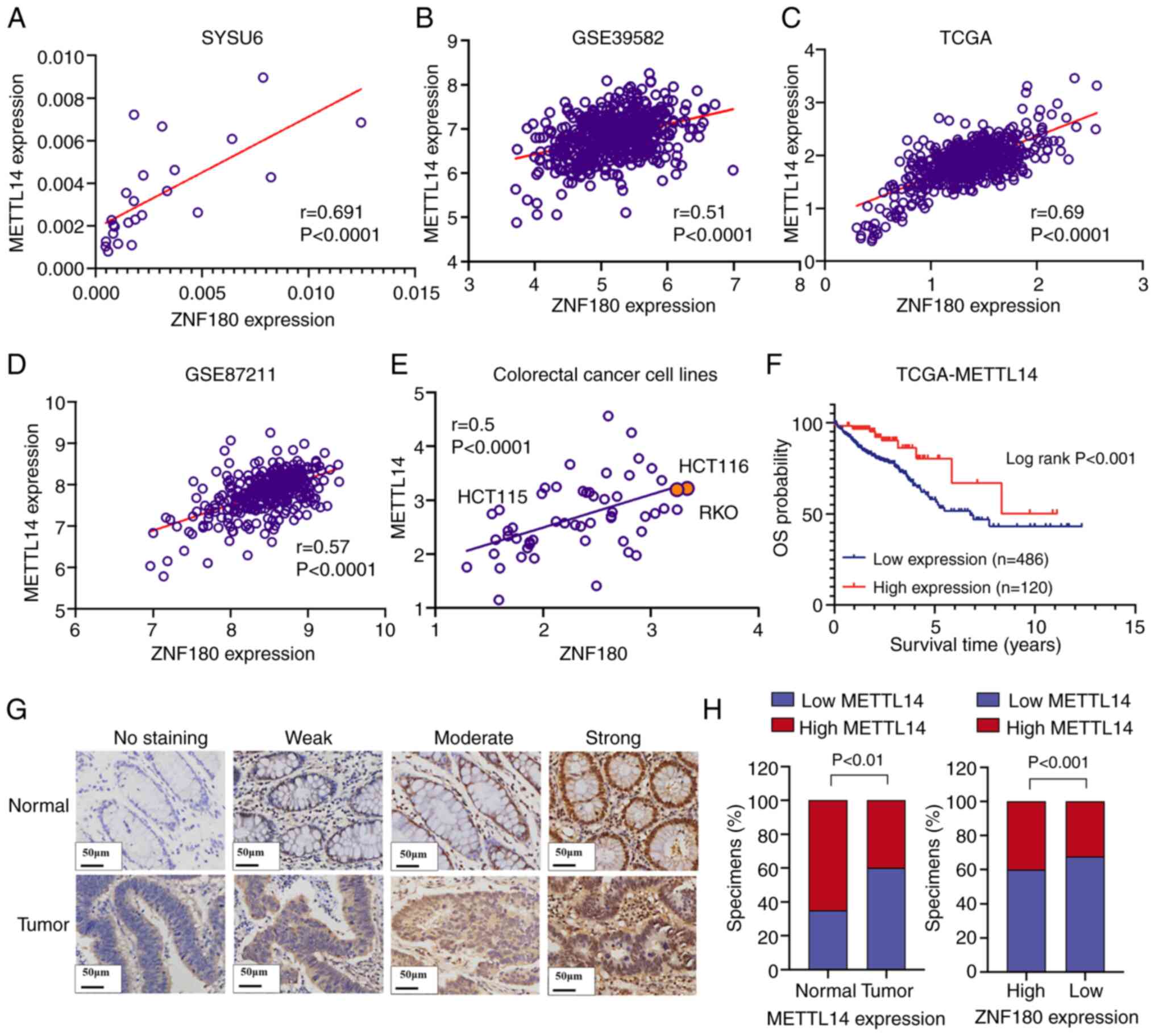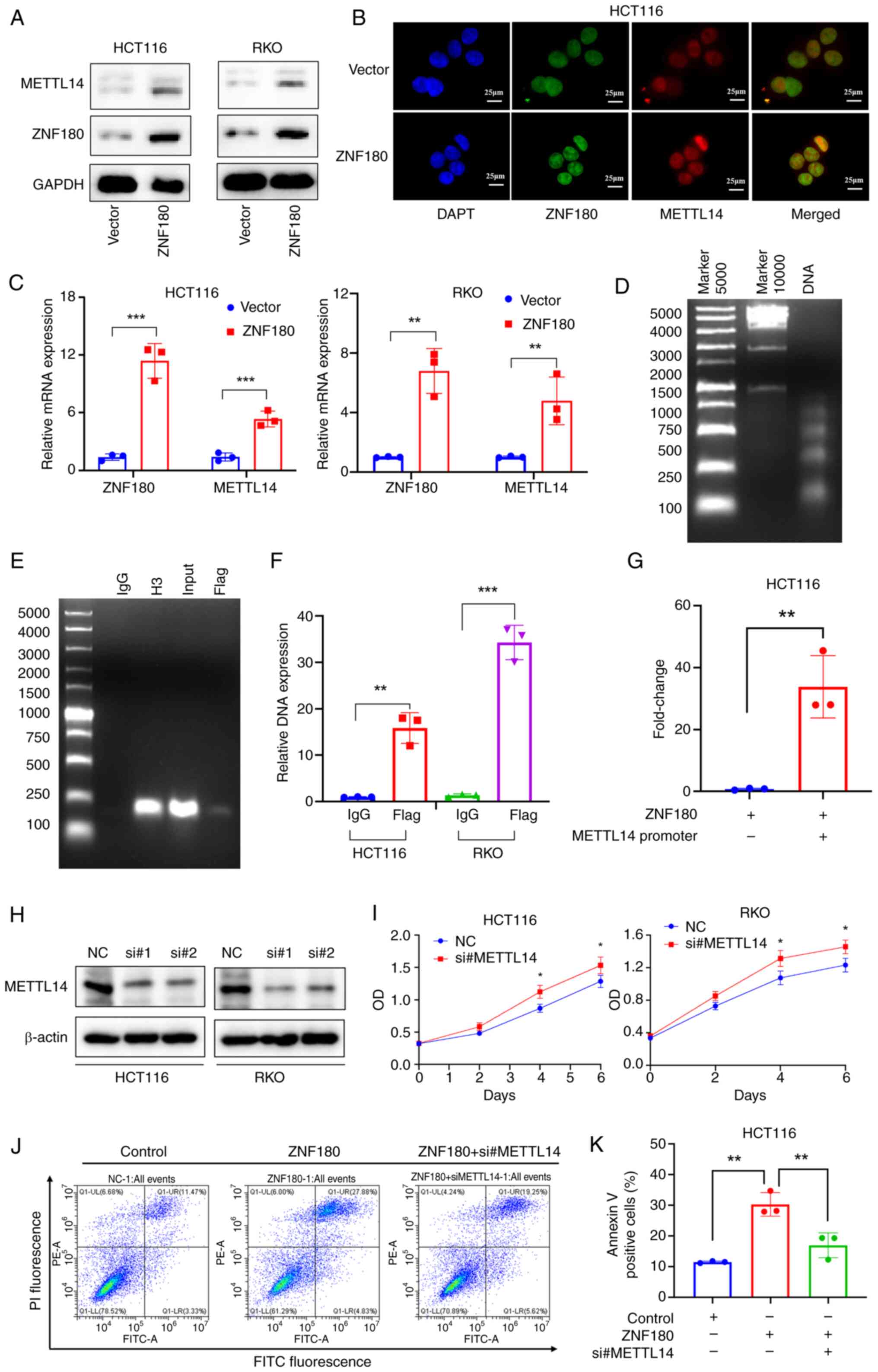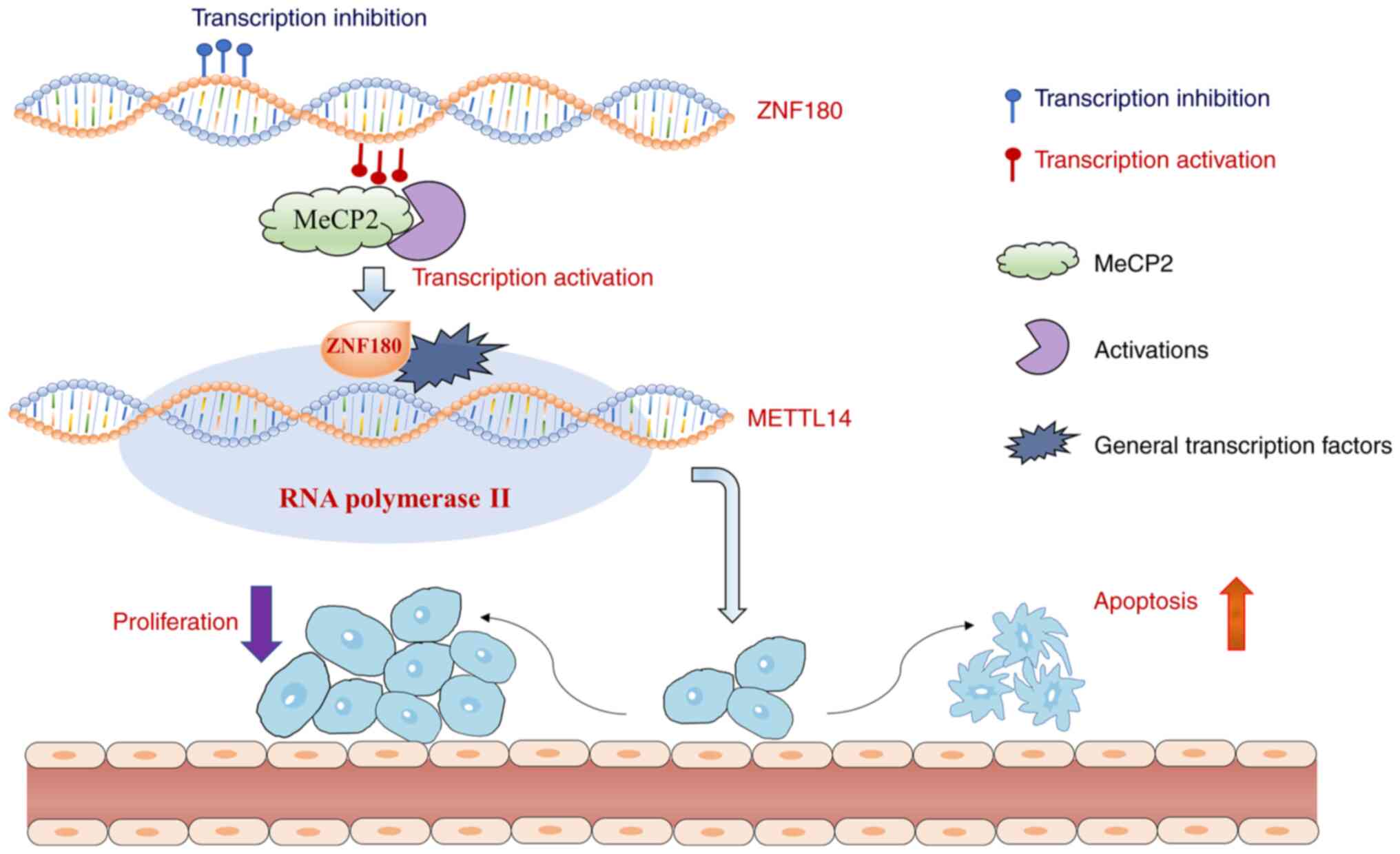|
1
|
Siegel RL, Miller KD, Fuchs HE and Jemal
A: Cancer Statistics, 2021. CA Cancer J Clin. 71:7–33. 2021.
View Article : Google Scholar
|
|
2
|
Siegel RL, Wagle NS, Cercek A, Smith RA
and Jemal A: Colorectal cancer statistics, 2023. CA Cancer J Clin.
73:233–254. 2023. View Article : Google Scholar
|
|
3
|
Roth AD, Tejpar S, Delorenzi M, Yan P,
Fiocca R, Klingbiel D, Dietrich D, Biesmans B, Bodoky G, Barone C,
et al: Prognostic role of KRAS and BRAF in stage II and III
resected colon cancer: Results of the translational study on the
PETACC-3, EORTC 40993, SAKK 60–00 trial. J Clin Oncol. 28:466–474.
2010. View Article : Google Scholar
|
|
4
|
Xu RH, Muro K, Morita S, Iwasa S, Han SW,
Wang W, Kotaka M, Nakamura M, Ahn JB, Deng YH, et al: Modified
XELIRI (capecitabine plus irinotecan) versus FOLFIRI (leucovorin,
fluorouracil, and irinotecan), both either with or without
bevacizumab, as second-line therapy for metastatic colorectal
cancer (AXEPT): A multicentre, open-label, randomised,
non-inferiority, phase 3 trial. Lancet Oncol. 19:660–671. 2018.
View Article : Google Scholar
|
|
5
|
Xie Y, Shi L, He X and Luo Y:
Gastrointestinal cancers in China, the USA, and Europe.
Gastroenterol Rep (Oxf). 9:91–104. 2021. View Article : Google Scholar
|
|
6
|
Okada M, Wang CY, Hwang DW, Sakaguchi T,
Olson KE, Yoshikawa Y, Minamoto K, Mazer SP, Yan SF and Pinsky DJ:
Transcriptional control of cardiac allograft vasculopathy by early
growth response gene-1 (Egr-1). Circ Res. 91:135–142. 2002.
View Article : Google Scholar
|
|
7
|
Song WM, Agrawal P, Von Itter R,
Fontanals-Cirera B, Wang M, Zhou X, Mahal LK, Hernando E and Zhang
B: Network models of primary melanoma microenvironments identify
key melanoma regulators underlying prognosis. Nat Commun.
12:12142021. View Article : Google Scholar
|
|
8
|
Klutstein M, Nejman D, Greenfield R and
Cedar H: DNA methylation in cancer and aging. Cancer Res.
76:3446–3450. 2016. View Article : Google Scholar
|
|
9
|
El Helou R, Wicinski J, Guille A, Adélaïde
J, Finetti P, Bertucci F, Chaffanet M, Birnbaum D, Charafe-Jauffret
E and Ginestier C: Brief reports: A distinct DNA methylation
signature defines breast cancer stem cells and predicts cancer
outcome. Stem Cells. 32:3031–3036. 2014. View Article : Google Scholar
|
|
10
|
Subramaniam D, Thombre R, Dhar A and Anant
S: DNA methyltransferases: A novel target for prevention and
therapy. Front Oncol. 4:802014. View Article : Google Scholar
|
|
11
|
Baylin SB and Jones PA: A decade of
exploring the cancer epigenome-biological and translational
implications. Nat Rev Cancer. 11:726–734. 2011. View Article : Google Scholar
|
|
12
|
Baylin SB and Jones PA: Epigenetic
determinants of cancer. Cold Spring Harb Perspect Biol.
8:a0195052016. View Article : Google Scholar
|
|
13
|
Kok-Sin T, Mokhtar NM, Ali Hassan NZ,
Sagap I, Mohamed Rose I, Harun R and Jamal R and Jamal R:
Identification of diagnostic markers in colorectal cancer via
integrative epigenomics and genomics data. Oncol Rep. 34:22–32.
2015. View Article : Google Scholar
|
|
14
|
Church TR, Wandell M, Lofton-Day C, Mongin
SJ, Burger M, Payne SR, Castaños-Vélez E, Blumenstein BA, Rösch T,
Osborn N, et al: Prospective evaluation of methylated SEPT9 in
plasma for detection of asymptomatic colorectal cancer. Gut.
63:317–325. 2014. View Article : Google Scholar
|
|
15
|
Chen WD, Han ZJ, Skoletsky J, Olson J, Sah
J, Myeroff L, Platzer P, Lu S, Dawson D, Willis J, et al: Detection
in fecal DNA of colon cancer-specific methylation of the
nonexpressed vimentin gene. J Natl Cancer Inst. 97:1124–1132. 2005.
View Article : Google Scholar
|
|
16
|
Chen XY, Zhang J and Zhu JS: The role of
m6A RNA methylation in human cancer. Mol Cancer. 18:1032019.
View Article : Google Scholar
|
|
17
|
Zhang BY, Han L, Tang YF, Zhang GX, Fan
XL, Zhang JJ, Xue Q and Xu ZY: METTL14 regulates M6A
methylation-modified primary miR-19a to promote cardiovascular
endothelial cell proliferation and invasion. Eur Rev Med Pharmacol
Sci. 24:7015–7023. 2020.
|
|
18
|
Chen X, Xu M, Xu X, Zeng K, Liu X, Pan B,
Li C, Sun L, Qin J, Xu T, et al: METTL14-mediated
N6-methyladenosine modification of SOX4 mRNA inhibits tumor
metastasis in colorectal cancer. Mol Cancer. 19:1062020. View Article : Google Scholar
|
|
19
|
Gu C, Wang Z, Zhou N, Li G, Kou Y, Luo Y,
Wang Y, Yang J and Tian F: Mettl14 inhibits bladder TIC
self-renewal and bladder tumorigenesis through N6-methyladenosine
of Notch1. Mol Cancer. 18:1682019. View Article : Google Scholar
|
|
20
|
Gong PJ, Shao YC, Yang Y, Song WJ, He X,
Zeng YF, Huang SR, Wei L and Zhang JW: Analysis of
N6-Methyladenosine methyltransferase reveals METTL14 and ZC3H13 as
tumor suppressor genes in breast cancer. Front Oncol.
10:5789632020. View Article : Google Scholar
|
|
21
|
Zhang X, Li D, Jia C, Cai H, Lv Z and Wu
B: METTL14 promotes tumorigenesis by regulating lncRNA
OIP5-AS1/miR-98/ADAMTS8 signaling in papillary thyroid cancer. Cell
Death Dis. 12:6172021. View Article : Google Scholar
|
|
22
|
Wang M, Liu J, Zhao Y, He R, Xu X, Guo X,
Li X, Xu S, Miao J, Guo J, et al: Upregulation of METTL14 mediates
the elevation of PERP mRNA N6 adenosine methylation
promoting the growth and metastasis of pancreatic cancer. Mol
Cancer. 19:1302020. View Article : Google Scholar
|
|
23
|
Weng H, Huang H, Wu H, Qin X, Zhao BS,
Dong L, Shi H, Skibbe J, Shen C, Hu C, et al: METTL14 inhibits
hematopoietic stem/progenitor differentiation and promotes
leukemogenesis via mRNA m6A modification. Cell Stem
Cell. 22:191–205.e9. 2018. View Article : Google Scholar
|
|
24
|
Xu L, Hu H, Zheng LS, Wang MY, Mei Y, Peng
LX, Qiang YY, Li CZ, Meng DF, Wang MD, et al: ETV4 is a theranostic
target in clear cell renal cell carcinoma that promotes metastasis
by activating the pro-metastatic gene FOSL1 in a PI3K-AKT dependent
manner. Cancer Lett. 482:74–89. 2020. View Article : Google Scholar
|
|
25
|
Bao YN, Cao X, Luo DH, Sun R, Peng LX,
Wang L, Yan YP, Zheng LS, Xie P, Cao Y, et al: Urokinase-type
plasminogen activator receptor signaling is critical in
nasopharyngeal carcinoma cell growth and metastasis. Cell Cycle.
13:1958–1969. 2014. View Article : Google Scholar
|
|
26
|
Li G, Su Q, Liu H, Wang D, Zhang W, Lu Z,
Chen Y, Huang X, Li W, Zhang C, et al: Frizzled7 promotes
epithelial-to-mesenchymal transition and stemness via activating
canonical Wnt/beta-catenin pathway in gastric cancer. Int J Biol
Sci. 14:280–293. 2018. View Article : Google Scholar
|
|
27
|
Livak KJ and Schmittgen TD: Analysis of
relative gene expression data using real-time quantitative PCR and
the 2(−Delta Delta C(T)) method. Methods. 25:402–408. 2001.
View Article : Google Scholar
|
|
28
|
Marisa L, de Reynies A, Duval A, Selves J,
Gaub MP, Vescovo L, Etienne-Grimaldi MC, Schiappa R, Guenot D,
Ayadi M, et al: Gene expression classification of colon cancer into
molecular subtypes: Characterization, validation, and prognostic
value. PLoS Med. 10:e10014532013. View Article : Google Scholar
|
|
29
|
Hu Y, Gaedcke J, Emons G, Beissbarth T,
Grade M, Jo P, Yeager M, Chanock SJ, Wolff H, Camps J, et al:
Colorectal cancer susceptibility loci as predictive markers of
rectal cancer prognosis after surgery. Genes Chromosomes Cancer.
57:140–149. 2018. View Article : Google Scholar
|
|
30
|
Raap M, Gierendt L, Kreipe HH and
Christgen M: Transcription factor AP-2beta in development,
differentiation and tumorigenesis. Int J Cancer. 149:1221–1227.
2021. View Article : Google Scholar
|
|
31
|
Liu J, Liu Z, Li M, Tang W, Pratap UP, Luo
Y, Altwegg KA, Li X, Zou Y, Zhu H, et al: Interaction of
transcription factor AP-2 gamma with proto-oncogene PELP1 promotes
tumorigenesis by enhancing RET signaling. Mol Oncol. 15:1146–1161.
2021. View Article : Google Scholar
|
|
32
|
Moore LD, Le T and Fan G: DNA methylation
and its basic function. Neuropsychopharmacology. 38:23–38. 2013.
View Article : Google Scholar
|
|
33
|
Krebs AR: Studying transcription factor
function in the genome at molecular resolution. Trends Genet.
37:798–806. 2021. View Article : Google Scholar
|
|
34
|
Xu L, Huang TJ, Hu H, Wang MY, Shi SM,
Yang Q, Lin F, Qiang YY, Mei Y, Lang YH, et al: The developmental
transcription factor IRF6 attenuates ABCG2 gene expression and
distinctively reverses stemness phenotype in nasopharyngeal
carcinoma. Cancer Lett. 431:230–243. 2018. View Article : Google Scholar
|
|
35
|
Yang X, Zhang S, He C, Xue P, Zhang L, He
Z, Zang L, Feng B, Sun J and Zheng M: METTL14 suppresses
proliferation and metastasis of colorectal cancer by
down-regulating oncogenic long non-coding RNA XIST. Mol Cancer.
19:462020. View Article : Google Scholar
|
|
36
|
Bhoumik A and Ronai Z: ATF2: A
transcription factor that elicits oncogenic or tumor suppressor
activities. Cell Cycle. 7:2341–2345. 2008. View Article : Google Scholar
|
|
37
|
Yang J, Lin Y, Huang Y, Jin J, Zou S,
Zhang X, Li H, Feng T, Chen J, Zuo Z, et al: Genome landscapes of
rectal cancer before and after preoperative chemoradiotherapy.
Theranostics. 9:6856–6866. 2019. View Article : Google Scholar
|
|
38
|
Bolli N, Avet-Loiseau H, Wedge DC, Van Loo
P, Alexandrov LB, Martincorena I, Dawson KJ, Iorio F, Nik-Zainal S,
Bignell GR, et al: Heterogeneity of genomic evolution and
mutational profiles in multiple myeloma. Nat Commun. 5:29972014.
View Article : Google Scholar
|
|
39
|
Corcoran RB, Andre T, Atreya CE, Schellens
JHM, Yoshino T, Bendell JC, Hollebecque A, McRee AJ, Siena S,
Middleton G, et al: Combined BRAF, EGFR, and MEK inhibition in
patients with BRAFV600E-Mutant colorectal cancer. Cancer Discov.
8:428–443. 2018. View Article : Google Scholar
|
|
40
|
Xu L, Lin Y, Chen X, Zheng L, Cheng Y, Hu
J, Zheng B, Zhang B, Li G, Chi Z, et al: A mutational signature for
colorectal cancer prognosis prediction: Associated with immune cell
infiltration. Clin Transl Med. 11:e4142021. View Article : Google Scholar
|
|
41
|
Kim AS, Bartley AN, Bridge JA, Kamel-Reid
S, Lazar AJ, Lindeman NI, Long TA, Merker JD, Rai AJ, Rimm DL, et
al: Comparison of laboratory-developed tests and FDA-approved
assays for BRAF, EGFR, and KRAS testing. JAMA Oncol. 4:838–841.
2018. View Article : Google Scholar
|
|
42
|
Levine M: Transcriptional enhancers in
animal development and evolution. Curr Biol. 20:R754–R763. 2010.
View Article : Google Scholar
|
|
43
|
Bulger M and Groudine M: Functional and
mechanistic diversity of distal transcription enhancers. Cell.
144:327–339. 2011. View Article : Google Scholar
|
|
44
|
Petrykowska HM, Vockley CM and Elnitski L:
Detection and characterization of silencers and enhancer-blockers
in the greater CFTR locus. Genome Res. 18:1238–1246. 2008.
View Article : Google Scholar
|
|
45
|
Vokes SA, Ji H, Wong WH and McMahon AP: A
genome-scale analysis of the cis-regulatory circuitry underlying
sonic hedgehog-mediated patterning of the mammalian limb. Genes
Dev. 22:2651–2663. 2008. View Article : Google Scholar
|
|
46
|
Ayer S and Benyajati C: Conserved enhancer
and silencer elements responsible for differential Adh
transcription in Drosophila cell lines. Mol Cell Biol.
10:3512–3523. 1990. View Article : Google Scholar
|
|
47
|
Gaszner M and Felsenfeld G: Insulators:
exploiting transcriptional and epigenetic mechanisms. Nat Rev
Genet. 7:703–713. 2006. View Article : Google Scholar
|
|
48
|
Ohtsuki S, Levine M and Cai HN: Different
core promoters possess distinct regulatory activities in the
Drosophila embryo. Genes Dev. 12:547–556. 1998. View Article : Google Scholar
|
|
49
|
Calhoun VC, Stathopoulos A and Levine M:
Promoter-proximal tethering elements regulate enhancer-promoter
specificity in the Drosophila Antennapedia complex. Proc Natl Acad
Sci USA. 99:9243–9247. 2002. View Article : Google Scholar
|
|
50
|
Spitz F and Furlong EE: Transcription
factors: From enhancer binding to developmental control. Nat Rev
Genet. 13:613–626. 2012. View Article : Google Scholar
|
|
51
|
Field A and Adelman K: Evaluating enhancer
function and transcription. Annu Rev Biochem. 89:213–234. 2020.
View Article : Google Scholar
|
|
52
|
Shannon M, Hamilton AT, Gordon L,
Branscomb E and Stubbs L: Differential expansion of zinc-finger
transcription factor loci in homologous human and mouse gene
clusters. Genome Res. 13:1097–1110. 2003. View Article : Google Scholar
|
|
53
|
Yang L, Han Y, Suarez Saiz F and Minden
MD: A tumor suppressor and oncogene: The WT1 story. Leukemia.
21:868–876. 2007. View Article : Google Scholar
|
|
54
|
Das Mandal S and Ray PS:
Transcriptome-wide analysis reveals spatial correlation between
N6-methyladenosine and binding sites of microRNAs and RNA-binding
proteins. Genomics. 113:205–216. 2021. View Article : Google Scholar
|
|
55
|
Li B, Wang X, Li Z, Lu C, Zhang Q, Chang
L, Li W, Cheng T, Xia Q and Zhao P: Transcriptome-wide analysis of
N6-methyladenosine uncovers its regulatory role in gene expression
in the lepidopteran Bombyx mori. Insect Mol Biol. 28:703–715. 2019.
View Article : Google Scholar
|
|
56
|
Zhou H, Yin K, Zhang Y, Tian J and Wang S:
The RNA m6A writer METTL14 in cancers: Roles, structures, and
applications. Biochim Biophys Acta Rev Cancer. 1876:1886092021.
View Article : Google Scholar
|















